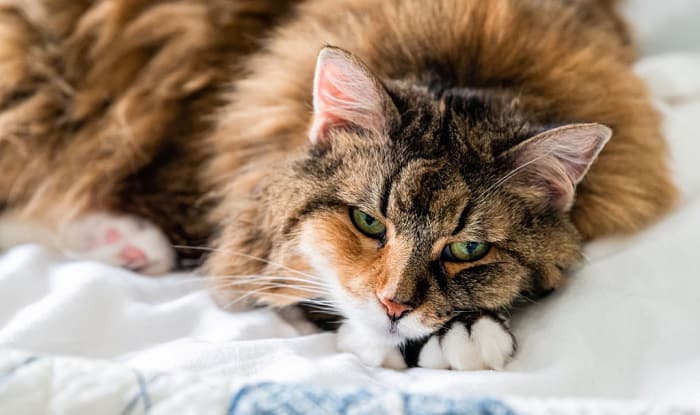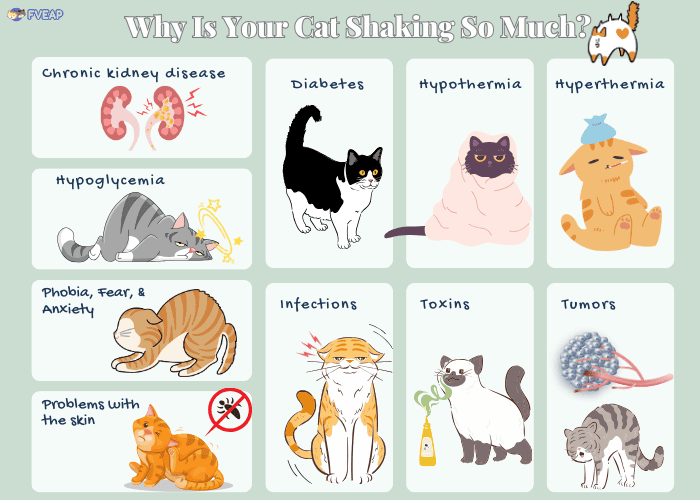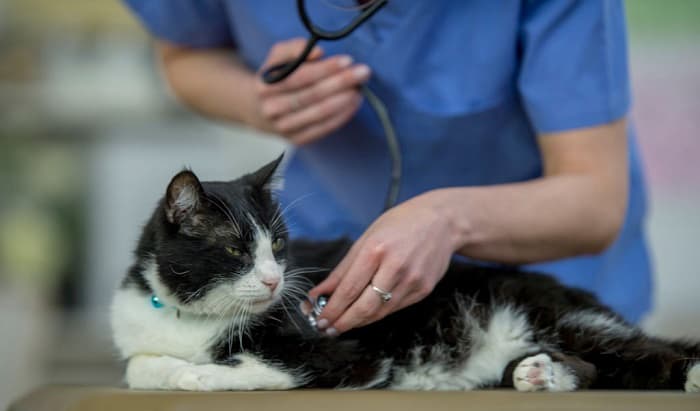When their cat shivers, many of us are concerned and perplexed, thinking something is wrong. Understandably, if your normally healthy cat has started shaking often, this is an issue for a concerned owner.
Shivering in pets can be caused by various factors, including fear, anxiety, cold, or noise. In addition, your cat’s severe shaking has been linked to a variety of medical issues.
So, why is my cat shaking?” The details below might help you respond quickly and to your pet’s benefit.
Table of Contents
Why Is Your Cat Shaking So Much?
1. Hypoglycemia – Glucose Deficiency
The most prevalent cause of kittens shaking is Hypoglycemia. If your cat hasn’t eaten enough for a long time, its blood sugar level will drop. In the majority of cases, this ailment causes your cat to shiver. It’s similar to what happens when a person’s blood sugar is lower than the average level.
2. Diabetes
Diabetes is a common cause of cat shaking uncontrollably that requires medical attention. Older cats are more likely to develop diabetes and experience shivering.
If your cat is drinking a lot more water than usual, it might indicate that they have diabetes.
3. Decreased body temperature – Hypothermia
A cat’s body temperature ranges between 100.5 and 102.5 degrees Fahrenheit. You may see your cat shivering a lot, especially if it’s a baby, which may cause you concern. Adult cats can maintain constant body temperatures in all weather conditions.
Kittens, on the other hand, are more vulnerable. They cannot control their body temperatures well, and you may see them shaking in cold weather due to a slight drop in body temperature.
Use blankets and a heated atmosphere to warm it up, so you don’t have to witness your baby kitten shivering all the time.
4. High body temperature – Hyperthermia
A high body temperature in your cat might cause them to tremble. If your cat gets a fever, this is the most typical cause.
Fevered cats are typically tired, unable to eat, or simply not themselves. You can tell if it’s sick when feeling the tips of your cat’s ears. If you suspect your cat has a fever, see a veterinarian immediately, especially if they aren’t eating.
Cats can also have heatstroke, which causes hyperthermia or a high body temperature.
Hyperthermia is more severe than a fever-induced rise in body temperature. Heatstroke is less common in cats than in dogs, presumably because most cats spend the warmest periods of the day indoors.
On hot days, though, it is still possible, so be cautious. Dribbling, pacing, fast breathing, tremors, or loss of consciousness are further warning symptoms to look out for.
Chill, moist towels can be placed over or beneath your cat to help them cool down and feel more comfortable until you can visit your veterinarian.
5. Phobia, Fear, and Anxiety
Cats, like people, may become frightened and tremble! Cats can have phobias, which can cause them to become anxious.
For cats, the most common fears are fireworks and thunderstorms. Because both of these occurrences create excessive noise, exacerbated by their acute sensitivity to vibrations and intense hearing, so it is not uncommon to notice your cat trembling in these conditions.
Other typical scenarios that cause your cat to shake or tremble include if your cat has been through trauma or suffers from separation anxiety. Other indicators to watch for in an anxious or terrified cat, aside from the shaking, include hiding or diarrhea.
If you suspect your cat is anxious and shaking, you should pay a visit to the local veterinarian for suitable therapy or medicine.
6. Infections
Infections might cause your cat to tremor or shake. If your cat develops a fever, discomfort, or nausea, this is likely. Poorly behaved cats may become agitated, causing them to tremble.
Because of pain or discomfort, your cat may only shake the region where the illness is present. Ears, paws, mouth, eyes, and nose are all common places for infections in cats. Cats suffering from cat flu may shake their heads to discharge mucus from their nostrils.
Other symptoms may include a strong odor in the affected region, a lack of appetite, or fatigue.
7. Toxins
Neurotoxins are poisons that cause your cat to shiver or twitch. Outdoor cats are more likely to contact poisons such as slug pellets, rotten food, rodenticides, and lead. Make sure to examine your garden for these dangers.
Permethrin poisoning is another prevalent toxin in cats. Permethrin can be found in flea treatments for dogs. Your cat might be exposed to permethrin by mistake or in close contact with dogs. As pet owners, we may potentially expose our cats to dangers in the home. Tremors are a typical symptom of being exposed to chocolate, coffee, or essential oils.
Shaking or twitching is one of the most common symptoms of permethrin poisoning in cats, followed by stumbling, respiratory issues, and convulsions, and death.
Toxicity symptoms in cats generally begin fast and progress swiftly. If you suspect your cat has been exposed to toxins, contact your veterinarian right once.
8. Problems with the skin
If your cat has a skin condition, its skin may twitch. Flea infestations are the most frequent, but allergies and illnesses are also common. Fleas agitate your cat and can cause uncontrollable skin spasms.
Some cats may have an allergic reaction to flea saliva, resulting in itchy, crusty areas all over their back. Your cat will require flea prevention and skin treatment.
9. Chronic kidney disease
Seizures affect several cat breeds as a result of severe renal disease. Kidney disease is a common problem among our feline companions. Their liver and renal organs frequently fail to work correctly, causing waste materials to accumulate in the circulation.
In this case, your cat loses his appetite and appears to be sick. Shivering is a warning indication that something is wrong with their kidneys.
If you suspect this or have ruled out the other possibilities, schedule a blood test as soon as possible.
10. Tumors
Tumors that induce shaking are more likely to occur in older cats. Tumors or malignancies might cause changes in your cat’s behavior in the nerves or brain. Jerky movements, twitching, heightened sensitivity to touch or light, or seizures may be present in your cat.
The diagnosis of nervous system tumors is difficult. The severe symptoms, including seizures, must first be controlled by your veterinarian. Your cat may require a brain scan to rule out a tumor, which may necessitate referral to a specialized facility.
Final Thought
These are the causes of “why is my cat shaking?” It has the potential to be damaging to your pet’s health.
If this mysterious ailment appears suddenly or has become common, you should take it carefully. To come up with the finest medication and therapy for your pet, you must examine the circumstances.
If at all feasible, take your pet to the veterinarian for the best precautions. We wish you and your pet the best of health!

I am Amy Sawy, a Doctor of Veterinary Medicine (DVM) graduate from the University of Kansas. y husband, Dr. Plummer, and I own a veterinary clinic in Phillipsburg, Kansas. In addition to my professional background, I am a devoted pet owner myself, with a household that includes dogs, rodents, and most notably, cats – a total of five felines in my home.
In 2020, I joined an organization as a professional writer, leveraging my experience and collaborating with my team to deliver the most valuable information for your cat’s care.












